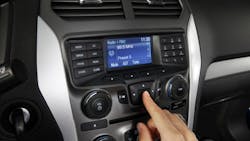As Vehicles Become More High-Tech, Automakers Worry that Distracted-Driving Lawsuits Could Rise
Each day, nine people die and 1,140 people are injured in vehicle crashes involving distracted drivers, according to the latest statistics from the National Highway Traffic Safety Administration.
What happens if and when the victims of such accidents sue the companies that provided the technology that distracted the drivers?
That's a question automotive executives are asking more and more, as new cars and trucks roll off the assembly lines loaded with multimedia entertainment systems and other high-tech bells and whistles designed to keep consumers connected.
In a survey conducted by the law firm Dkyema's automotive practice, executives from automotive OEMs and suppliers pointed to distracted driving as their top liability concern tied to emerging technologies.
It's easy to see why accident victims would go after automotive companies, asserts Aleksandra Miziolek, director of Dykema's Automotive Industry Group.
"Whenever there's an accident, the plaintiff's bar is looking for deep pockets," Miziolek says. "And clearly both the automaker and suppliers are viewed as potential deep pockets."
With that said, though, Miziolek notes that automakers have taken great pains to ensure that in-vehicle technology is designed and configured "with the utmost care and safety." Most in-vehicle multimedia systems, for example, have voice-activation features to encourage drivers to keep their hands on the wheel.
Indeed, she adds that "the No. 1 way in which they can minimize exposure" is by focusing on safety "in the development phase."
In Dykema's survey, conducted in July 2012 and released this past October, nearly 36% of automotive executives identified driver distraction as their top liability concern tied to emerging technologies.
Executives' second-biggest liability concern: data ownership.
It's an issue that has nothing to do with vehicle safety -- but rather the safety and protection of drivers' personal information, and the legal and privacy issues associated with that.
Chrysler boasts that its Uconnect system is "clever enough" to synchronize with up to 1,000 contacts from your mobile phone "every time you get into your vehicle." With consumers clamoring for connectivity in their vehicles, that kind of information sharing likely is just the tip of the iceberg.
"I believe we're going to see more and more people focused on, 'All this technology in the car is giving people way more information about me and where I am and what I'm doing than I ever expected anyone to have,'" Miziolek explains. "And there will be lawsuits with respect to that as well."
As vehicles collect more and more data from consumers, Miziolek believes that the auto industry will face increasing pressure to share it. And that could open up a Pandora's box of privacy issues.
The conventional wisdom is that existing state and federal privacy laws will govern claims related to data ownership, but Miziolek adds that "it's a brand new world."
"Right now the assumption is that the current laws will somehow provide the needed protection," she says. "But as the uses for data become more creative, that's really going to test whether the current laws are adequate."
About the Author
Josh Cable
Former Senior Editor
Former Senior Editor Josh Cable covered innovation issues -- including trends and best practices in R&D, process improvement and product development. He also reported on the best practices of the most successful companies and executives in the world of transportation manufacturing, which encompasses the aerospace, automotive, rail and shipbuilding sectors.
Josh also led the IndustryWeek Manufacturing Hall of Fame, IW’s annual tribute to the most influential executives and thought leaders in U.S. manufacturing history.
Before joining IndustryWeek, Josh was the editor-in-chief of Penton Media’s Government Product News and Government Procurement. He also was an award-winning beat reporter for several small newspapers in Northeast Ohio.
Josh received his BFA in creative writing from Bowling Green University, and continued his professional development through course-work at Ohio University and Cuyahoga Community College.
A lifelong resident of the Buckeye State, Josh currently lives in the Tremont neighborhood of Cleveland. When the weather cooperates, you’ll find him riding his bike to work, exercising his green thumb in the backyard or playing ultimate Frisbee.
